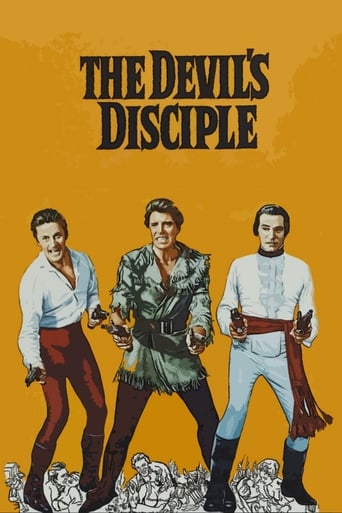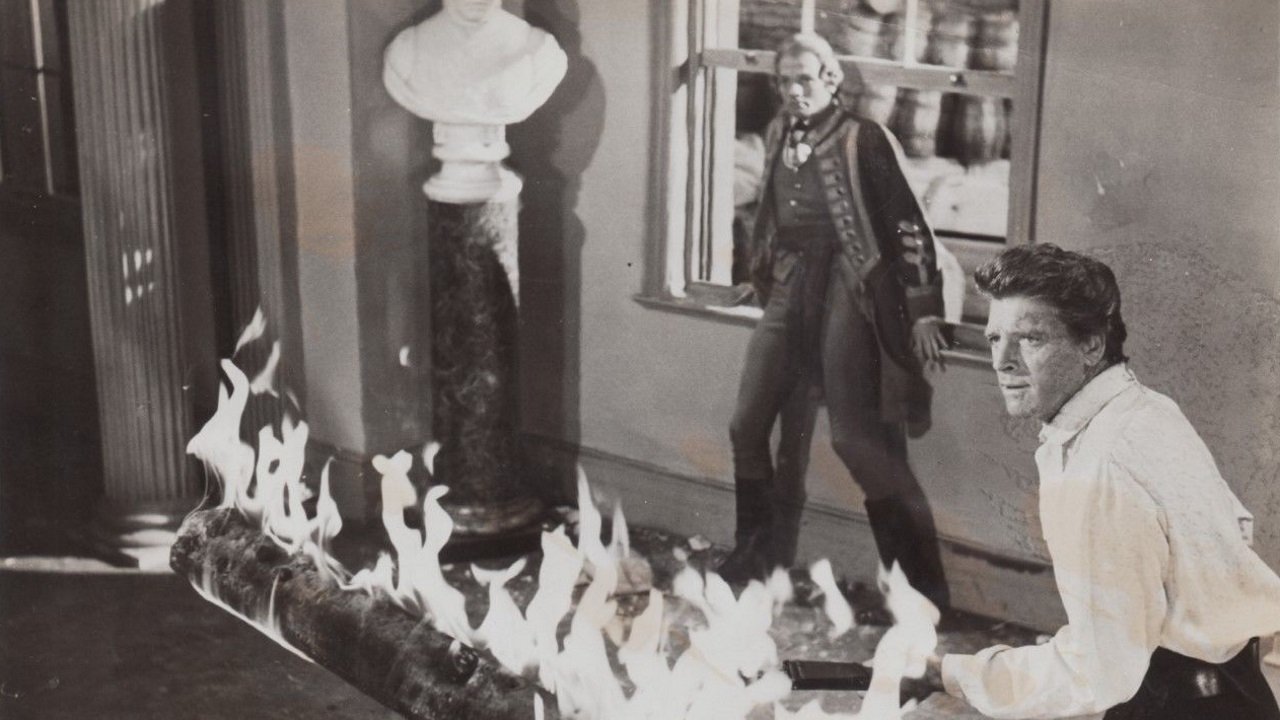david-sarkies
I was actually quite chuffed to discover that this movie was on Youtube, namely because it is based on a play by George Bernard Shaw, one of my favourite playwrights. While there are a couple of more extreme parts of the play cut out (such as when Richard Dudgeon gives his speech on being a disciple of the devil), the play is pretty much intact (though why they kept the name is beyond me because I would have suspected that they may have wanted to change the name so as not to offend the mass market audience, though the fact that two of Hollywood's big names of the period were the lead actors probably ended up countering that fact).The story is set during the American Revolutionary War and is about how the black sheep of the village decides to take the place of the village vicar on the gallows, and how the person whom everybody dislikes turns out to be the noblest of all of the people in the village. It is also about inversions in that the vicar, a man of peace, becomes a man of war, and how the man of mischief becomes a man of honour. These themes are directly ported across from the play, and remain as true in the film as they did on stage (as I mentioned, the main digression from the play was when they cut out the 'devil's disciple speech, though there is also a lot of filler).The other theme in the play is the nature of good and evil, and what exactly is good and evil. To the British rebelling against the empire was considered evil, and an offence punishable by death, however to the colonists, the attacks on their liberty, and unfair taxation, was a wrong that cried out to be rightened. In the end the revolutionary war was pretty much like any other war: a dispute between the ruling classes who ended up using the working classes as the means in which to vent their frustrations. Okay, maybe in this instance the members of the American ruling class fought alongside the workers (and created the myth of the classless society so that the workers would believe that they were fighting for freedom and equality), but what is flagged is that this was not the case with the British, where the reason that the troops in New York were not dispatched was because the minister in charge preferred a holiday than actually prosecuting the war.
Robert J. Maxwell
It's a story about mixed up identities and conflicting loyalties during the American Revolution, more sassy comedy than anything else, although Kirk Douglas barely escapes the noose.Good cast, too. Not just Kirk Douglas but Burt Lancaster. They made many films together. I counted them. There were one thousand, four hundred, and thirty two, not counting cartoon voiceovers. Lawrence Olivier gives a sterling performance as the quick-witted and likable General Burgoyne. Anyone who wants to see how the original General Burgoyne lived is free to visit his preserved house in Wilmington, North Carolina. Also in the cast are other familiar faces: Harry Andrews and Mervyn Johns, whom you'll recognize as Bob Cratchet from the best of the "Christmas Carol" movies.But I believe a special round of applause is due to Allan Cutherbertson. I'm not sure the poor guy ever played anything other than stuffy, stiff-necked, military officers, usually with an offensive little ginger mustache. He was the British officer who wanted to let the evesdropping laundry boy go in "The Guns of Navarone." Here, his attempt to stop Lancaster from blowing up a powder dump and ending a battle leads to a bout of athletics and gives Lancaster a chance to leap around and fling furniture across the room.George Bernard Shaw's play was written sometime in the 1890s, I think. The dialog is of the period but the wit still tickles. "Give a rebel enough rope and he'll hang somebody else." The lads handle the somewhat starchy lines with aplomb. Olivier, of course, had no trouble at all convincing me that he was General Burgoyne.
waynec50
This is a terrific film. The cast is great, Sir Laurence Olivier's Gentlemanly Johnny Burgoyne is the perfect balance of dreamer, cynic and realist, Burt Lancaster is exceptional as the minister who finds another calling as a patriot, Kirk Douglas is Dick Dudgeon, "devil's disciple", who is probably more righteous than the hypocrites who condemn him for his lifestyle, Janette Scott is the preacher's upright and uptight wife who discovers a less than spiritual side of herself when Dick unselfishly takes her husband's place as a British prisoner soon to be hanged. Harry Andrews rounds out the headliners as the bloodthirsty and officious Major Swindon, who wants to hang seemingly everyone who crosses his path, while reciting platitudes that would make a super-patriot blush. The film starts with the hanging of Dick's father. His brothers and other relatives are scared out of their wits and take the cowardly way out, seeming to ignore the fact. Ne'er do well Dick, however risks his life and brings his father back to the church for a Christian burial. He and Anthony Anderson, the minister engage in a witty chat over Dad's body that evening. The reverend gives Dad a send-off, but the British arrive in town and see the new grave. Dad leaves almost everything to Dick, with a small bequest to Dick's younger brother, excluding their mother. Mom leaves the house in a huff, cursing her son. Rev Anderson is told by Dick's squeeze that the British have seen the grave and are going to arrest Dick. The Rev goes to tell him and brings him home to the rectory, when he receives word that Mrs Dudgeon is dying and needs him (the minister). Anthony leaves Dick with his wife, and then comes a hilarious scene as the uncomfortable and contemptuous Judith makes him feel as unwanted as possible while still keeping up Christian hospitality. Sure enough, the soldiers come and arrest Dick believing he's the reverend. Dick's farewell to his "wife" ends in a steamy kiss and embrace. Judith races to her husband, and in another riotous scene tells him Dick has been arrested in his place. Rev,"Confound Richard. He's given me a debt I can't repay". But the minister takes off in an effort to get the local patriots to help free Dick, but as the narrator relates, they're too busy trying to kill their enemies to save one of their friends. Anthony winds up in the middle of a battle and turns the tide for the Americans. While this is happening, Dick is put on a completely impartial trial, while gallows are constructed outside. More witty exchanges ensue between Dick, Burgoyne and Swindon before Judith tries to save him by telling the British that he's not her husband. It doesn't work and they schedule the hanging. Anthony rides up just in the nick of time and in a new outfit of buckskin, to present terms to Burgoyne and negotiates Dick's release. Judith must choose between her crush on Dick and her newly revived love for her newly remodeled man of action husband. General Burgoyne tells Major Swindon that soon their army will face unfavorable odds and lose. This movie has everything, fine acting, satire, romance, action, slapstick and philosophy. The only thing is, it's too bad it wasn't made in color to see the uniforms and scenery.
bkoganbing
Burt Lancaster and Kirk Douglas, both players who chose rather successfully to chart their own careers, decided on their third co-starring film to jointly produce it as well. The property chosen was George Bernard Shaw's The Devil's Disciple which takes place in the northern theater of operations in the American Revolution.Shaw's wit is going full tilt here as he's having a great old time blasting upper and middle class pretensions of British society. The vehicle he uses is General John Burgoyne who lost the Battle of Saratoga to the rebel army which guaranteed French recognition and European aid for the colonists. Both Lancaster as Parson Anthony Anderson and Kirk Douglas as committed non-believer Dick Dudgeon play larger than life characters here as they usually do and both have their moments. But in fact this film is stolen completely out from under them by Sir Laurence Olivier as General Burgoyne.As a previous reviewer noted, Shaw wrote the best lines in the play for the Burgoyne character. But it takes the skill of a player like Olivier to bring them off. Burgoyne was very much a product of Georgian Great Britain, a cynical man in a very cynical business. By the way Harry Andrews as Major Swinton does an excellent job essentially as Burgoyne's straight man. Andrews is a pompous sort of character and Olivier tosses the bon mots off him like a handball player.The story involves Dudgeon being mistaken for Anderson and being sentenced to hang for rebel activity. Anderson arouses the populace and sheds his parson's collar for rebel activity and saves Dudgeon from the noose. Burgoyne quits the town he was occupying and goes off to his destiny at Saratoga.But in this case as in a lot of Shaw plays, the story isn't as important as the commentary. And when the commentary is delivered by Olivier, it's being brought to you by the best.


 AD
AD



